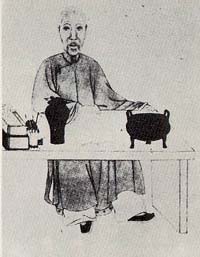Gallery of Philologists
Rwan Ywaen
21 Feb 1764 - 27 Nov 1849A lifelong man of letters and patron of learning; a precise and generous spirit. His forbears included a successful military commander, and Rwan Ywaen's own gift for organization and his sense of the larger agenda is evident throughout his career.
He passed the state examinations in 1789, and received a series of literary appointments in the Palace. In 1793, while Director of Education in Shandung, he compiled under Bi Ywæn's direction a catalogue of all early Shandung inscriptions on bronze and stone, prefiguring his later work in establishing the best texts of the Thirteen Classics. In 1795 he was transferred to Jvjyang, again as Director of Education, and employed more than forty scholars in the compilation of his dictionary of usages in the Classics, the Jing-ji Dzwan-gu (1797-1798, printed 1800, supplement 1801). Among Rwan's lesser-known scholarly enterprises is the collaborative Chou-rvn Jwan, begun at this time (1797) but completed only later (1799). It included the biographies of 280 astronomers and mathematicians, among them 37 Europeans. It became the standard work on its subject, and supplements were added by others, the fourth appearing in 1898. In this as in many of his projects, Rwan Ywæn made a beginning that later ages found it valuable to continue and improve on.
He was assigned to Peking in 1798, and was a director of the metropolitan examination of 1799, which was famous for the large number of those passing it who later had eminent careers in government or scholarship. He served as Governor of Jvjyang in 1800-1809, where he promoted learning by establishing academies and sponsoring publication projects. When Rwan was in Ningbwo as an examiner during 1803-1804, he ordered the Fan family to compile a catalogue of their unique collection of rare books, the Tyen-yi Gv library; this catalogue, listing 4,094 items, was finally printed in 1808.
During the period of mourning for his father (1805-1807) he printed his own notes on the Classics: the Shr-san Jing Jyau-kan Ji (1806).

He became Governor of Jyangsyi in 1814. Using the earliest texts available to him, most of them from Sung times, including stone-inscribed versions, he produced in 1816 what is still the definitive edition of the Thirteen Classics and their commentaries: the [Sung-bvn] Shr-san Jing Ju-shu. His own earlier collation notes on these texts (Jyau-kan Ji) were appended to this edition. Rwan was assiduous in recommending titles omitted from the Sz-ku Chywæn-shu, their number eventually reaching 175. His annotations to these works appeared in 1822 as the Sz-ku Wei-shou Shu-mu Ti-yau: "Abstracts of Works Not Included in the Sz-ku Chywaen-shu."
His later career was a succession of southern Governorships, most notably that of Gwangdung. In that position, he sponsored the comprehensive Hwang-Ching Jing-jye, a still standard collection of classical commentaries in the progressive tradition of "evidential scholarship" (kaujvngsywe). Its compilation spanned the years 1825-1829, and when completed it included 180 works, comprising 1,400 jywaen in 366 volumes.
In his governmental role, Rwan Ywæn adopted a strict but ultimately flexible policy toward British traders at Gwangdung; for this he was criticized at the time, but admired in retrospect, after the more confrontationist stance of Lin Dzv-syw had brought on the war of 1840-1842. After other southern governorships, he was called to Peking as a Grand Secretary in 1835, but was permitted to retire due to illness in 1838. On his 80th birthday (1843) and again in 1846 he was awarded special honors. He died in 1849.
A copy of Rwan's evidential scholarship collection, the Hwang-ching Jing-jye, was presented together with other works by the Government of China to the Government of the United States in 1869. These formed the nucleus of the Chinese collection in the Library of Congress. Let that link stand as a favorable omen of continued progress overseas, in the tradition partly defined and organized by Rwan Ywaen.
Readings
- Arthur W Hummel. Eminent Chinese 1/399-402
1 Dec 2005 / Contact The Project / Exit to Gallery Index Page